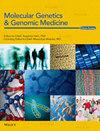Parental mosaicism rather than de novo variants in FOXG1‐related syndrome and TUBA1A‐associated Tubulinopathy: Familial case reports
IF 1.5
4区 医学
Q4 GENETICS & HEREDITY
引用次数: 0
Abstract
BackgroundDe novo variations are a primary cause of Rett syndrome and Tubulinopathy, accounting for over 90% of cases. Some studies have identified and documented parental inheritance by mosaicism in these two disorders, albeit with limited data.MethodsClinical characteristics and diagnosis, including genetic tests of members of two families, were obtained from medical reports.ResultsThe first family with Rett syndrome (RTT) presented with two offspring carryingFOXG1相关综合征和TUBA1A相关管蛋白病中的亲代嵌合而非新生变异:家族病例报告
背景新发变异是导致雷特综合征和管状细胞病的主要原因,占病例的 90% 以上。一些研究发现并记录了这两种疾病的亲代嵌合遗传,尽管数据有限。方法从医疗报告中获得临床特征和诊断结果,包括对两个家族成员的基因检测。两个受影响的 RTT 孕妇在怀孕头三个月内均未出现异常,因此无法在产前及早发现。第二个家庭的三个后代中有两个被确诊为 TUBA1A c.172G>A 与结核病有关。这两个家庭的年轻夫妇都没有携带与子女病情相关的变异体。结论 在新发变异渗透率较高的遗传疾病中,生育复发婴儿的风险是与受影响家庭讨论的一个重要话题。通过检查兄弟姐妹共有的变异,临床诊断可提供有关是否存在镶嵌遗传的宝贵信息。为了长期有效地进行管理,应重视充分的遗传咨询和对未来妊娠的战略规划,以降低后代复发的风险。
本文章由计算机程序翻译,如有差异,请以英文原文为准。
求助全文
约1分钟内获得全文
求助全文
来源期刊

Molecular Genetics & Genomic Medicine
Biochemistry, Genetics and Molecular Biology-Genetics
CiteScore
4.20
自引率
0.00%
发文量
241
审稿时长
14 weeks
期刊介绍:
Molecular Genetics & Genomic Medicine is a peer-reviewed journal for rapid dissemination of quality research related to the dynamically developing areas of human, molecular and medical genetics. The journal publishes original research articles covering findings in phenotypic, molecular, biological, and genomic aspects of genomic variation, inherited disorders and birth defects. The broad publishing spectrum of Molecular Genetics & Genomic Medicine includes rare and common disorders from diagnosis to treatment. Examples of appropriate articles include reports of novel disease genes, functional studies of genetic variants, in-depth genotype-phenotype studies, genomic analysis of inherited disorders, molecular diagnostic methods, medical bioinformatics, ethical, legal, and social implications (ELSI), and approaches to clinical diagnosis. Molecular Genetics & Genomic Medicine provides a scientific home for next generation sequencing studies of rare and common disorders, which will make research in this fascinating area easily and rapidly accessible to the scientific community. This will serve as the basis for translating next generation sequencing studies into individualized diagnostics and therapeutics, for day-to-day medical care.
Molecular Genetics & Genomic Medicine publishes original research articles, reviews, and research methods papers, along with invited editorials and commentaries. Original research papers must report well-conducted research with conclusions supported by the data presented.
 求助内容:
求助内容: 应助结果提醒方式:
应助结果提醒方式:


